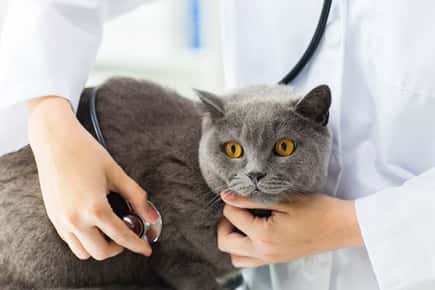
Humans are not the only ones who can suffer from asthma. It is a condition that can also afflict cats. Feline asthma is similar to human asthma, in that it is a chronic inflammation of the airways inside the lungs. During an asthma attack, these airways become constricted, and the lungs create mucus and release it into the airways. This makes it difficult for the cat to breathe.
Asthma Symptoms
Cats suffering from feline asthma can experience labored breathing in many forms. Some endure wheezing, rapid breathing, open mouth breathing, or gasping for breath. Others manifest a persistent cough and may gag up mucus while coughing. This can leave a cat with a pronounced lack of energy and put them in a weakened state; cats can die from an asthma attack.
Asthma Causes
Most cases of feline asthma can be traced to an allergic reaction that occurs when a cat breathes in any substance that stimulates their immune system. The lungs suffer inflammation resulting from an over-reaction by their immune system to the foreign substance in their bodies.
Several common factors can trigger asthma attacks in cats. These include exposure to allergens like pollen, mold, dust, and cigarette smoke. It can be a result of ingesting foods to which the cat is allergic. Other health problems sometimes play a role. Heart problems, obesity, or infection with parasites can exacerbate asthma signs. Stress can also induce asthma attacks in felines.
Asthma typically develops in cats who are two years and older. Female cats have been found to develop asthma in higher numbers than male cats.
Preventing Asthma
There is no cure for feline asthma, but there are ways to reduce symptoms in your cat. Medication prescribed by a veterinarian is one tool cat owners can use to help their pets manage asthma attacks. Veterinarians can prescribe oral medications, or even have you use an inhaler on your cat.
Cat owners can also make things easier on their pet by reducing their exposure to chemicals and allergens that serve as asthma triggers. Keeping your cat fit through exercise and a healthy diet will also reduce the risk of suffering asthma attacks. Finally, reducing stress for your cat can be helpful as stress tends to worsen asthma symptoms when an attack occurs.
Asthma does not need to lessen your cat's quality of life. Recognizing the symptoms and doing your part to prevent and treat asthma attacks will help keep this condition from threatening their life.
Source:
"Asthma," ASPCA.


